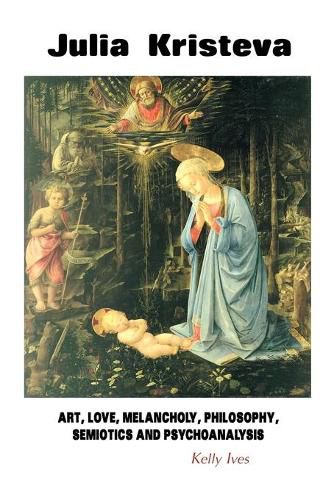Readings Newsletter
Become a Readings Member to make your shopping experience even easier.
Sign in or sign up for free!
You’re not far away from qualifying for FREE standard shipping within Australia
You’ve qualified for FREE standard shipping within Australia
The cart is loading…






This title is printed to order. This book may have been self-published. If so, we cannot guarantee the quality of the content. In the main most books will have gone through the editing process however some may not. We therefore suggest that you be aware of this before ordering this book. If in doubt check either the author or publisher’s details as we are unable to accept any returns unless they are faulty. Please contact us if you have any questions.
J U L I A K R I S T E V A
ART, LOVE, MELANCHOLY, PHILOSOPHY, SEMIOTICS AND PSYCHOANALYSIS
By Kelly Ives
Julia Kristeva was born in Bulgaria in 1941. Educated in part by French nuns, she was involved early on in her life with Communist Party youth organizations and children’s groups. Since moving to Paris in the 1960s, Kristeva has risen in stature in intellectual circles so that she is now regarded as one of the most important thinkers of the contemporary era.
EXTRACT FROM CHAPTER 7: JULIA KRISTEVA’S THEORY OF LOVE
For Julia Kristeva, love embodies both the semiotic and the symbolic, both knowledge and joy (pace Baruch de Spinoza), both language and affect. Kristeva has written of love in a way that is not facile, demeaning, banal, stereotypical, sexist or pornographic. Her pronouncements on love are quite different from those in the ‘classic’ texts of love, such as Ovid’s poems, or the mediaeval Art of Love, or Elizabethan sonnet sequences, or Stendhal’s De l'Amour, or Denis de Rougement’s L'Amour et l'occident (Love in the Western World). When Kristeva writes -
Vertigo of identity, vertigo of words: love, of the individual, is that sudden revelation, that irremediable cataclysm, of which one speaks only after the fact. Under its sway, one does not speak of. ( In Praise of Love )
Love is the time and space in which I assumes the right to be extraordinary. Sovereign yet not individual. Divisible, lost, annihilated; but also, and through imaginary fusion with the loved one, equal to the infinite space of superhuman psychism. Paranoid? I am, in love, at the zenith of subjectivity.
How great this first chapter of Histoires d'amour is, as great as Stendhal’s De l'Amour or Sigmund Freud’s The Ego and the Id, or Jacques Lacan’s Ecrits. Kristeva describes love as a transgressive, sometimes violent wildness (D.H. Lawrence’s term ‘infinite sensual violence’ is apposite here).
REVISED AND UPDATED, WITH NEW ILLUSTRATIONS.
The text has been revised again and updated for this fifth edition.
Illustrated, including a selection of art by Giovanni Bellini. Also available in paperback.
European Writers Series. Bibliography and notes. 180pp.
$9.00 standard shipping within Australia
FREE standard shipping within Australia for orders over $100.00
Express & International shipping calculated at checkout
This title is printed to order. This book may have been self-published. If so, we cannot guarantee the quality of the content. In the main most books will have gone through the editing process however some may not. We therefore suggest that you be aware of this before ordering this book. If in doubt check either the author or publisher’s details as we are unable to accept any returns unless they are faulty. Please contact us if you have any questions.
J U L I A K R I S T E V A
ART, LOVE, MELANCHOLY, PHILOSOPHY, SEMIOTICS AND PSYCHOANALYSIS
By Kelly Ives
Julia Kristeva was born in Bulgaria in 1941. Educated in part by French nuns, she was involved early on in her life with Communist Party youth organizations and children’s groups. Since moving to Paris in the 1960s, Kristeva has risen in stature in intellectual circles so that she is now regarded as one of the most important thinkers of the contemporary era.
EXTRACT FROM CHAPTER 7: JULIA KRISTEVA’S THEORY OF LOVE
For Julia Kristeva, love embodies both the semiotic and the symbolic, both knowledge and joy (pace Baruch de Spinoza), both language and affect. Kristeva has written of love in a way that is not facile, demeaning, banal, stereotypical, sexist or pornographic. Her pronouncements on love are quite different from those in the ‘classic’ texts of love, such as Ovid’s poems, or the mediaeval Art of Love, or Elizabethan sonnet sequences, or Stendhal’s De l'Amour, or Denis de Rougement’s L'Amour et l'occident (Love in the Western World). When Kristeva writes -
Vertigo of identity, vertigo of words: love, of the individual, is that sudden revelation, that irremediable cataclysm, of which one speaks only after the fact. Under its sway, one does not speak of. ( In Praise of Love )
Love is the time and space in which I assumes the right to be extraordinary. Sovereign yet not individual. Divisible, lost, annihilated; but also, and through imaginary fusion with the loved one, equal to the infinite space of superhuman psychism. Paranoid? I am, in love, at the zenith of subjectivity.
How great this first chapter of Histoires d'amour is, as great as Stendhal’s De l'Amour or Sigmund Freud’s The Ego and the Id, or Jacques Lacan’s Ecrits. Kristeva describes love as a transgressive, sometimes violent wildness (D.H. Lawrence’s term ‘infinite sensual violence’ is apposite here).
REVISED AND UPDATED, WITH NEW ILLUSTRATIONS.
The text has been revised again and updated for this fifth edition.
Illustrated, including a selection of art by Giovanni Bellini. Also available in paperback.
European Writers Series. Bibliography and notes. 180pp.